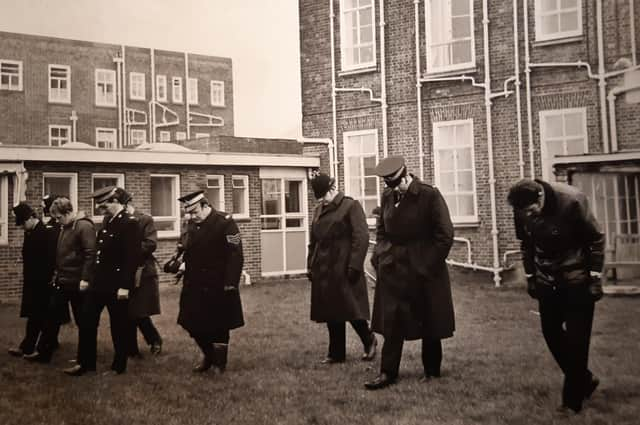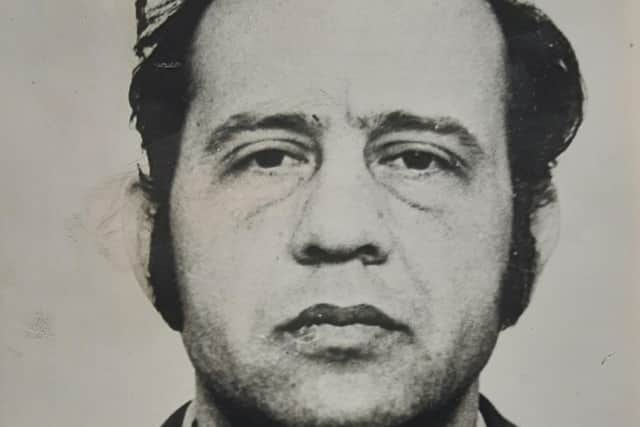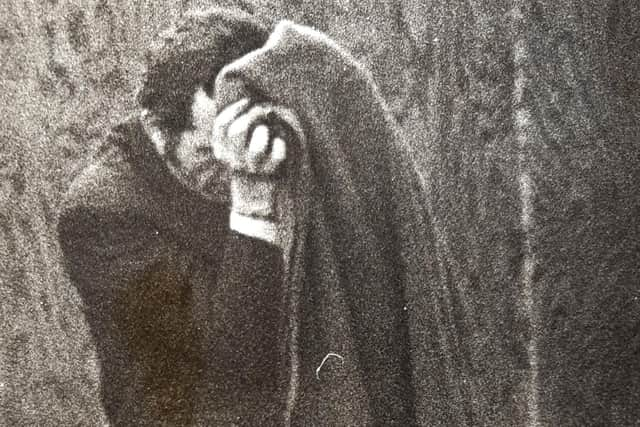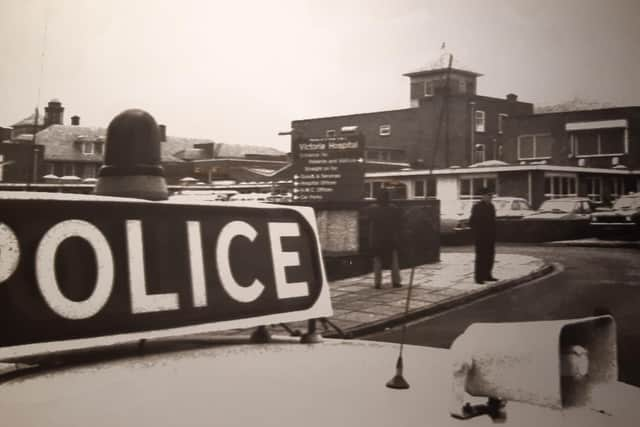Horror when a doctor launched a knife attack on the children's wards of Blackpool Victoria Hospital


It was a night of horror many people will not easily forget. The night a doctor stalked the corridors of a hospital children’s ward in a schizophrenic rage – armed with a vicious looking Spanish clasp knife with a four inch blade.
Dr Ahmad Alami, tall and striking, was a son of Grand Mufti of Jerusalem. He had been a star pupil and was a fully qualified eye doctor.
Advertisement
Hide AdAdvertisement
Hide AdBut, as it later – and tragically – emerged, he was also a dangerous, paranoid schizophrenic, who was found unfit to plead when he was brought to trial charged with three child murders and three attempted murders at Lancaster Crown Court in June the same year.


He was senior houseman in the ophthalmic department at Blackpool Victoria Hospital and had been there for about seven months when tragedy struck.
The drama began about midnight on February 17, 1972 and ended in a bloodbath. Three children were stabbed to death as they slept in their cots in a dimly lit ward. Another child and two nurses were left seriously hurt.
Like the Fred Sewell trial which was in progress at the time (trial for the murder of Blackpool Chief Inspector Gerald Richardson) the Alami affair attracted international interest and made headline news around the world.
Advertisement
Hide AdAdvertisement
Hide AdStaff nurse Dorothy Simpson was first to raise the alarm. The assailant, who went into a frenzied rage on being refused sleeping pills, stabbed her and pupil nurse Christine Nuttall before rushing into the ward and stabbing four children who were sleeping nearest the door. Three doctors tried vainly to save the children.


Staff nurse Simpson managed, despite her injuries, to telephone the night superintendent and call the police. Only one of the stabbed children, two year old Darren Qamar, survived. The children who died were Deborah Carson, aged four, Martin Langhorne and Nicholas Scott, who were both two.
For the investigating team, which grew to nearly 400 police officers, Operation Knife began about 12.30am on February 17 when, as a result of a message flashed to Blackpool police control room, a major manhunt started around Blackpool Victoria Hospital.
It lasted until 41-year-old Dr Alami was apprehended and charged later that evening. Joe Mounsey, who later became an assistant chief constable in Lancashire Constabulary and was CID chief at the time, was engaged in the Sewell trial at Manchester as well as being in charge of the investigations into the Wrea Green lovers’ lane killing. He found time to look in during the early stages of the manhunt but was not involved. The then chief constable, Bill Palfrey and Chief Supt Harold Prescott were both there.
Advertisement
Hide AdAdvertisement
Hide AdThe head of Lancashire CID Det Chief Supt Wilf Brooks was then second-in-command and took overall charge of the inquiry.


Mr Brooks, who led the manhunt, summed it up succinctly when I saw him recently at Hutton HQ.
He said: “My recollection is of the horrific nature of it all.”
The police team, including tracker dogs, began a methodical search of the grounds for the murder weapon and inquiries swung into action to track down the killer. A description and an artist’s impression of the attacker were circulated. He was thought to be possibly someone connected with the hospital staff.
Advertisement
Hide AdAdvertisement
Hide AdThe grim riddle was solved several hours later when Dr Alami, who had gone back to work at the hospital after the stabbings as if nothing had happened, was arrested in his flat in the doctors’ quarters of the nearby Whinacre hostel, by Mr Brooks, Det Supt Frank Taylor and other officers.
The blood stained, black handled knife was found in the doctor’s flat. There were several tell tale clues including a footprint from one of his brown moccasin shoes which had been left in the residue of sticky blackcurrent juice on the ward floor.
This print was discovered by Dr Alan Clift, then chief chemist on the staff of the Home Office Forensic Science Laboratory, at Euxton.
It was captured in the spilt fruit juice remaining on the polished floor after it had been wiped.
Advertisement
Hide AdAdvertisement
Hide AdThere was a button from the doctor’s dark grey jacket which was found by fingerprint expert Eric Hargreaves on the ward floor and a gold cuff link which hospital porter Fred Jones found in one of the cots. A matching cuff link was recovered by Det Sgt Alan law, from the doctor’s dressing table in his flat.
At the time Mr Palfey said it was the worst crime he had known in 45 years police service because of the child victims. He still holds that view.
And there must be many people who like him cannot understand why Dr Alami, with his history of mental illness, was allowed to continue as an eye doctor. Particularly in view of the evidence by two psychiatrists at the Lancaster hearing that Dr Alami had suffered from paranoid schizophrenia for a long time.
He had been a doctor for 10 years but had been unfavourably reported on for his behaviour while he was in the Jordan Army Medical Corps. He had worked at hospitals in London, Bournemouth and Rochdale before heading to Blackpool where the hospital authorities were unaware of his mental background.
Advertisement
Hide AdAdvertisement
Hide AdDuring the short hearing at Lancaster both prosecution and defence called evidence about the state of Dr Alami’s mind.
Mr Justice Cantley told the jury he was satisfied Dr Alami was under such a disability that he could not fairly be tried. He was unfit to plead by reason of mental illness. So Dr Alami, who had barely uttered a word during the several Blackpool remands and committal proceedings and who remained silent at Lancaster, was ordered to be detained at Broadmoor.
Despite calls by relatives of the victims and Fylde MP Walter Clegg for a public inquiry the Minister for Social Services Sir Keith Joseph declined to act and the inquest on the toddlers was not re-opened. I remember talking at the time to the Irish born mother of the stabbed boy who survived.
At her Blackpool home, not far from the hospital where it all happened, Mrs Mary Qamar protested to me about Dr Alami being kept on at the hospital in view of his mental state.
Advertisement
Hide AdAdvertisement
Hide AdShe said bluntly: “If he was a psychopath I don’t think it was right that he should be allowed to practice.”
Colleagues described Dr Alami as a quiet man who kept himself to himself and lived for his work. There was talk that Dr Alami, who had been taking drugs because he couldn’t sleep, had missed his wife who had returned to Jerusalem for health reasons the previous October.
There was an unconfirmed report that either just before or just after the stabbings he had performed a delicate eye operation.
One of the child victims was due to be discharged the next day. Another child in the ward escaped because of his bad habit of sleeping with his head under the covers. But sadly he later died.
Advertisement
Hide AdAdvertisement
Hide AdDr Alami, not long afterwards was freed from Broadmoor and flown back to his native Jerusalem.”
On the day of the murders, the husband of one of the nurses who was injured in the attached blamed the attack on an episode of ‘Softly Softly’, a police drama series.
Arnold Simpson, who lived in Blackpool Old Road said: “A little boy was stabbed to death on television and the same night, this happens.”
Staff nurse Dorothy Simpson had worked at the hospital for seven years and was on permanent night duty specialising in paediatrics. Her husband was asleep in his armchair when the hospital night sister rang him.
Advertisement
Hide AdAdvertisement
Hide Ad“I had fallen asleep after watching television right through to the end,” he said.
“I went straight down to the hospital. On the way in the car it all seemed so unreal it was like a bad dream.
“Dorothy was under very heavy sedation when I got there and I stayed most of the night.
“She must have been very brave. Although she had been stabbed close to the heart, she managed to crawl to the telephone on her desk and dialled the night superintendent’s number.
Advertisement
Hide AdAdvertisement
Hide Ad“Then people came from all directions. My wife heard steps on the corridor as she worked at her desk and when she went to the door saw the man who said he was a member of staff and wanted some sleeping tablets.
“ She was not very happy about it and he went straight for her, stabbing her in the chest then attacking the other nurse. If she had not managed to raise the alarm, the man might have stabbed all the children in the ward.”
Comment Guidelines
National World encourages reader discussion on our stories. User feedback, insights and back-and-forth exchanges add a rich layer of context to reporting. Please review our Community Guidelines before commenting.